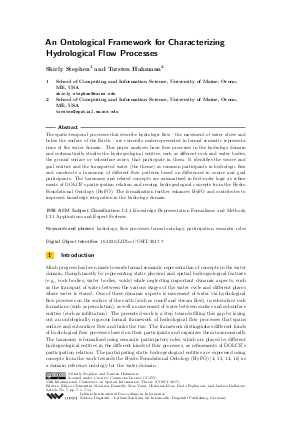An Ontological Framework for Characterizing Hydrological Flow Processes
Authors Shirly Stephen, Torsten Hahmann
-
Part of:
Volume:
13th International Conference on Spatial Information Theory (COSIT 2017)
Part of: Series: Leibniz International Proceedings in Informatics (LIPIcs)
Part of: Conference: Conference on Spatial Information Theory (COSIT) - License:
 Creative Commons Attribution 3.0 Unported license
Creative Commons Attribution 3.0 Unported license
- Publication Date: 2017-08-29
File

PDF
LIPIcs.COSIT.2017.7.pdf
- Filesize: 0.55 MB
- 14 pages
Document Identifiers
Subject Classification
Keywords
- hydrology
- flow processes
- formal ontology
- participation
- semantic roles
Metrics
- Access Statistics
-
Total Accesses (updated on a weekly basis)
0Document
0Metadata
Abstract
The spatio-temporal processes that describe hydrologic flow - the movement of water above and below the surface of the Earth -- are currently underrepresented in formal semantic representations of the water domain. This paper analyses basic flow processes in the hydrology domain and systematically studies the hydrogeological entities, such as different rock and water bodies, the ground surface or subsurface zones, that participate in them. It identifies the source and goal entities and the transported water (the theme) as common participants in hydrologic flow and constructs a taxonomy of different flow patterns based on differences in source and goal participants. The taxonomy and related concepts are axiomatized in first-order logic as refinements of DOLCE's participation relation and reusing hydrogeological concepts from the Hydro Foundational Ontology (HyFO). The formalization further enhances HyFO and contributes to improved knowledge integration in the hydrology domain.
Cite As Get BibTex
Shirly Stephen and Torsten Hahmann. An Ontological Framework for Characterizing Hydrological Flow Processes. In 13th International Conference on Spatial Information Theory (COSIT 2017). Leibniz International Proceedings in Informatics (LIPIcs), Volume 86, pp. 7:1-7:14, Schloss Dagstuhl – Leibniz-Zentrum für Informatik (2017)
https://doi.org/10.4230/LIPIcs.COSIT.2017.7
BibTex
@InProceedings{stephen_et_al:LIPIcs.COSIT.2017.7,
author = {Stephen, Shirly and Hahmann, Torsten},
title = {{An Ontological Framework for Characterizing Hydrological Flow Processes}},
booktitle = {13th International Conference on Spatial Information Theory (COSIT 2017)},
pages = {7:1--7:14},
series = {Leibniz International Proceedings in Informatics (LIPIcs)},
ISBN = {978-3-95977-043-9},
ISSN = {1868-8969},
year = {2017},
volume = {86},
editor = {Clementini, Eliseo and Donnelly, Maureen and Yuan, May and Kray, Christian and Fogliaroni, Paolo and Ballatore, Andrea},
publisher = {Schloss Dagstuhl -- Leibniz-Zentrum f{\"u}r Informatik},
address = {Dagstuhl, Germany},
URL = {https://drops.dagstuhl.de/entities/document/10.4230/LIPIcs.COSIT.2017.7},
URN = {urn:nbn:de:0030-drops-77639},
doi = {10.4230/LIPIcs.COSIT.2017.7},
annote = {Keywords: hydrology, flow processes, formal ontology, participation, semantic roles}
}
Author Details
References
-
Bas Aarts. English Syntax and Argumentation. Palgrave &Macmillan, 3rd edition, 2008.

-
James F. Allen. Maintaining knowledge about temporal intervals. Comm. ACM, 26(11):832-823, 1983.

-
Boyan Brodaric. GroundWaterML2 - GW2IE Final Report. Technical report, Open Geospatial Consortium, 2015. Engineering Report 15-082, version 2.1.

-
Boyan Brodaric and Torsten Hahmann. Towards a foundational hydro ontology for water data interoperability. In 11th Int. Conference on Hydroinformatics (HIC-2014), 2014.

-
Walter A. Cook. Case grammar: development of the matrix model (1970-1978). Georgetown University Press, 1979.

-
Anusuriya Devaraju and Werner Kuhn. A process-centric ontological approach for integrating geo-sensor data. In International Conference on Formal Ontology in Information Systems (FOIS-10), pages 199-212. IOS Press, 2010.

-
Emin C. Dogrul. Integrated water flow model (IWFM v3.1): Theoretical documentation. Dept. of Water Resources, State of California, 2009.

-
Irina Dornblut and Robert Atkinson. Hy_features: a geographic information model for the hydrology domain. Technical Report GRDC 43r1, Global Runoff Data Centre, 2013.

-
Chen-Chieh Feng, Thomas Bittner, and Douglas M. Flewelling. Modeling surface hydrology concepts with endurance and perdurance. In International Conference on Geographic Information Science (GIScience-04), pages 67-80. Springer, 2004.

-
Charles J. Fillmore. The case for case. In Emmon Bach and Robert T. Harms, editors, Universals in linguistic theory, pages 1-88. Holt, Rinehart and Winston, 1968.

-
Antony Galton. Outline of a formal theory of processes and events, and why GIScience needs one. In International Conference on Spatial Information Theory (COSIT-2015), pages 3-22. Springer, 2015.

-
Torsten Hahmann. A Reconciliation of Logical Representations of Space: from Multidimensional Mereotopology to Geometry. PhD thesis, Univ. of Toronto, 2013.

-
Torsten Hahmann and Boyan Brodaric. The void in hydro ontology. In International Conference on Formal Ontology in Information Systems (FOIS-12), pages 45-58. IOS Press, 2012.

-
Torsten Hahmann and Boyan Brodaric. Kinds of full physical containment. In International Conference on Spatial Information Theory (COSIT-13), pages 397-417. Springer, 2013.

-
Torsten Hahmann and Michael Grüninger. A naïve theory of dimension for qualitative spatial relations. In Symposium on Logical Formalizations of Commonsense Reasoning (CommonSense 2011) at the AAAI Spring Symposium (AAAI-SS 2011). AAAI Press, 2011.

-
Torsten Hahmann, Shirly Stephen, and Boyan Brodaric. Semantically refining the GWML2 with the help of a reference ontology. In International Conference on Geographic Information Science (GIScience-16), 2016.

-
INSPIRE Thematic Working Group Hydrography. D2.8.I.8_v3.1 INSPIRE Data Specification on Hydrography - Technical Guidelines. Technical report, INSPIRE, 2014.

-
Steven L. Markstrom, Richard G. Niswonger, R. Steven Regan, David E. Prudic, and Paul M. Barlow. GSFLOW-coupled ground-water and surface-water FLOW model based on the integration of the precipitation-runoff modeling system (PRMS) and the modular ground-water flow model (MODFLOW-2005). Technical report, Geological Survey (US), 2008.

-
Claudio Masolo, Stefano Borgo, Aldo Gangemi, Nicola Guarino, and Alessandro Oltramari. Wonderweb deliverable D18 - ontology library (final report). Technical report, National Research Council - Institute of Cognitive Sci. and Technology, Trento, 2003.

-
Gaurav Sinha, David Mark, Dave Kolas, Dalia Varanka, Boleslo E. Romero, Chen-Chieh Feng, Lynn E. Usery, Joshua Liebermann, and Alexandre Sorokine. An ontology design pattern for surface water features. In International Conference on Geographic Information Science (GIScience-14), pages 187-203. Springer, 2014.

-
Barry Smith et al. Basic Formal Ontology 2.0 Draft Specification Guide, 2012.

-
John F. Sowa. Knowledge Representation: Logical, Philosophical, and Computational Foundations. Brooks Cole, 1999.

-
A. Tripathi and H. A. Babaie. Developing a modular hydrogeology ontology by extending the SWEET upper-level ontologies. Comput. Geosci., 34(9):1022-1033, 2008.

